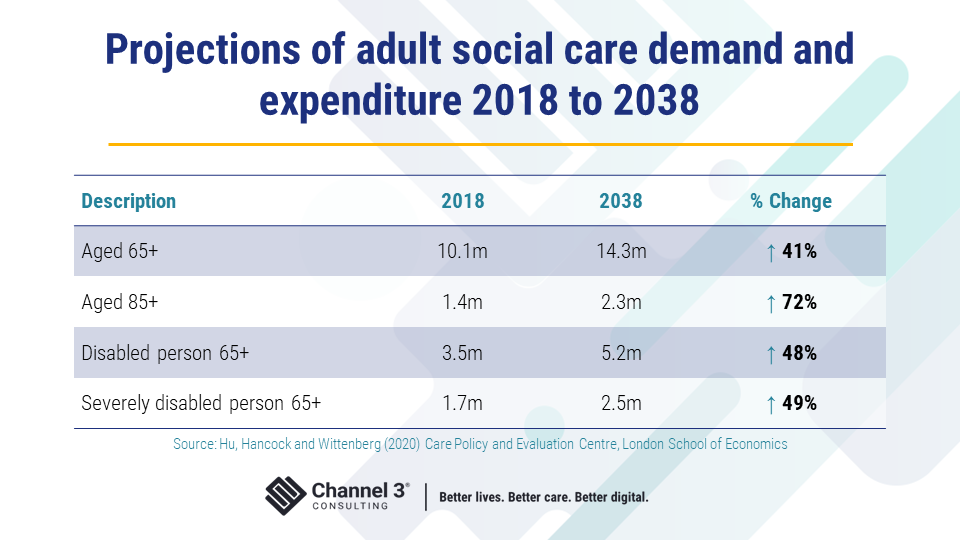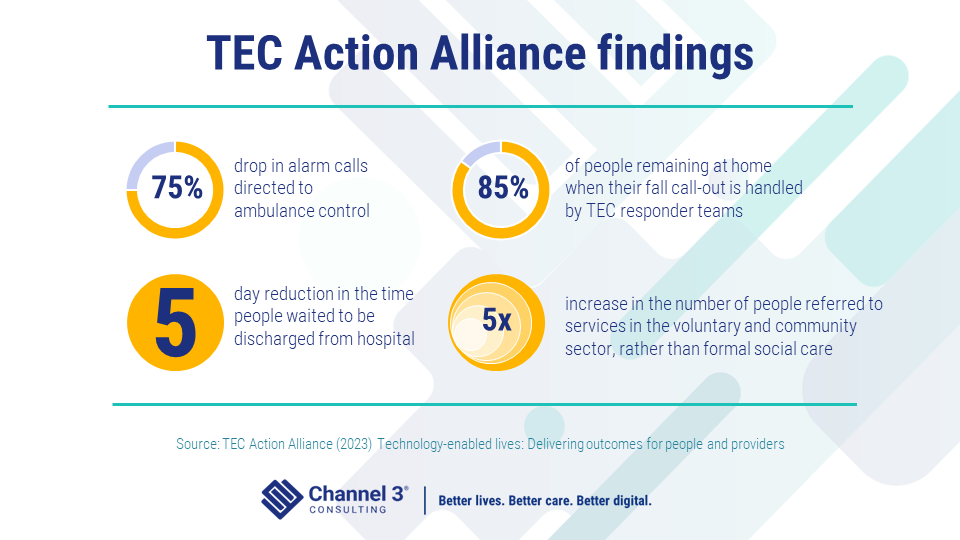Channel 3 Consulting is the headline sponsor of the ADASS Spring Seminar 2024, find out more here.
The ADASS Spring Seminar 2023 is a vital gathering for social care leaders and professionals in the UK. It provides an opportunity to learn about crucial issues and trends in adult social care, network and share best practices. This year’s event takes place 26th to 28th April and will attract directors of adult social services, policy makers, researchers and other key stakeholders from the social care sector.
Spring Seminar is a vital forum for shaping the future of adult social care in the UK, with innovation in social care and technology’s role in improving care services featuring high on the agenda. This year Channel 3 is proud to not only exhibit at the event, but will also be holding a workshop entitled ‘Is digital the underused superpower of social care?’.
Please spare two minutes to complete our social care survey, which will help to shape our discussions at Spring Seminar.
Is the current social care model sustainable?
The social care sector’s challenges are complex, but also well-known and understood (and we’ll dig into them at ADASS Spring Seminar). Yet as a nation, we have collectively failed to solve them.

If we look more closely it is possible to understand why many in the sector feel they cannot directly influence and solve these challenges:
• Demand: Projected to continue to increase significantly in both volume and complexity (see table below);
• Finances: There is still no long-term funding solution for the sector;
• Workforce: Capacity and wellbeing issues remain in the short term. It is doubtful that there will be enough care workers in future to meet demand within a traditional people-led model of care and support; and
• Market: The fragility of many providers is a direct symptom of the financial and workforce pressures outlined above.

This backdrop can help explain the recent shift in tone across the sector to one of ‘hope’, which was the key theme at the NCASC 2022 Conference. Turning to hope rather than action is a symptom of the frustration, fatigue and disempowerment being felt amongst strategic leads and frontline staff regarding their ability to influence a better social care future directly.
More positively though, there is an emerging and consistent narrative from sector leaders that things can’t continue as they are. There is recognition that the sector must do something different because, as Henry Ford once said:
If you always do what you always did, you’ll always get what you always got.
There is a growing sense that the current model of social care isn’t sustainable and that a level of disruption is required, rather than continued marginal improvements if we are to move to a better and more sustainable future.
The question is how?
At Channel 3 we passionately believe that digital presents the greatest opportunity to deliver the disruption to the current model of social care that is so desperately needed. As witnessed in most sectors, it is more a question of when the disruption will happen, rather than if it will.
We have recently invested significant time in crystalising our thinking and bringing to life what a digital vision for social care could look and feel like. This is borne out of our experience of co-producing and delivering complex change programmes in the sector for the last 8 years. Over this time we have also engaged with and made efforts to understand the innovation that exists within the digital marketplace. And, most importantly, we have taken the time to listen to those with lived experience to capture their aspirations for the model of care and support that would enable them to live their best lives.
Articulating a vision is important. Without one, the use of digital across the sector has lacked ambition and scale. A clear vision of the future enables us to think beyond the narrow-framed view that technology-enabled care (TEC) and small-scale pilots hold the answer.
There is evidence from TSA to show that the TEC and small-scale pilot approach has provided many small or targeted examples of positive impact:

However, the challenge remains that without getting to scale, the sector cannot begin to disrupt the operating model and therefore can’t realise the true benefits that digital offers.
We’ll now consider two examples of how digital could disrupt the current model of care and support.
Digital social care example 1: Realtime monitoring and intervention
If we deployed sensor/wearable technology at scale, we could move to near real-time monitoring and intervention of those in receipt of support. This would enable councils to disrupt the operating model and move away from the need for annual case reviews. This fundamental shift in approach could dramatically improve outcomes on many levels, for example:
• People would receive the right care at the right time, avoiding escalating needs and facilitating rapid step down in support to improve independence;
• Councils would see a reduction in the costs of care through avoiding crisis and enabling step up / step down at the right time;
• Staff would be more productive, using their time to engage with those most in need rather than being a hostage to a tick box annual review process; and
• Staff would have improved levels of wellbeing, morale and motivation as they would be enabled to focus on providing the right care at the right time.
Digital social care example 2: Virtual multi-disciplinary teams (MDTs)
If we digitally enabled and deployed the use of virtual MDTs at scale, we would be able to bring key professionals together, e.g. clinicians, occupational therapists, GPs, district nurses, social workers, digital/TEC specialists, physios, care providers and workers from the voluntary and community sectors. The focus would be on the person 24×7 to support improved decision-making at key points across the person’s journey through the health and care system.
This new approach would necessitate a change to the operating model to change processes and train and deploy health and care professionals in new ways of working. The benefits of this approach could be significant, for example:
- Improved decision-making at points of crisis to reduce ambulance conveyances to hospital;
- Improved diversion within emergency departments and reduced hospital admissions; and
- Improved hospital flow and discharge planning, leading to reduced length of stay and delayed discharges.
These benefits would ultimately lead to more people remaining at home or returning home quickly.
Why haven’t we unlocked digital disruption in social care?
We are faced with a quandary. The sector agrees it needs to do something different, it requires a level of disruption. To achieve this, we need to deliver digital at scale to disrupt the operating model and prove the real case for change.
However, system leaders and decision-makers are reluctant to invest at scale without a proven return on investment. Therefore, we get stuck making marginal service improvements (doing what you always did), which won’t address the inherent challenges the sector is facing.
At Channel 3 we are working with the sector to break the lock on digital, at scale. In the coming weeks in the run-up to the ADASS Spring Seminar, we will be sharing our vision for a digitally enabled future for social care. At the Spring Seminar, we will be running a workshop session to bring this to life as well as exploring how the sector can successfully deliver it.
We need your feedback and insights
At ADASS Spring Seminar we will be holding a workshop, ‘Is digital the underused superpower of social care?’. We are gathering feedback from across the sector and would like to hear your thoughts. If the form does not load below, you can access it here:
